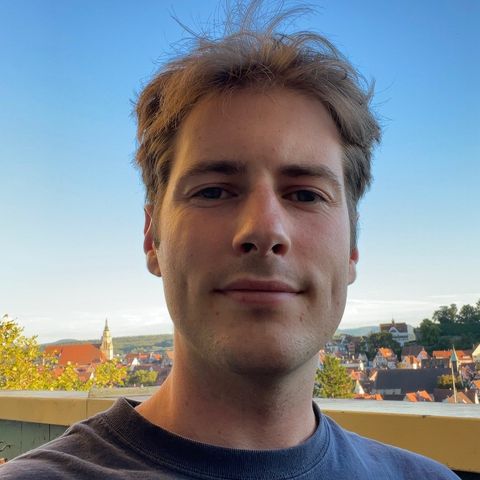Short Bio
Marcel Krämer is a PhD student in Physics and project assistant in the Computational Quantum Science research group at the Institute of Solid State Physics and Information Systems Engineering, under the supervision of Sabine Andergassen. His research focuses on developing theoretical methods for the description of strongly correlated electron systems, with a particular emphasis on quantum field-theoretic approaches such as dynamical mean-field theory and the functional renormalization group (fRG). His work aims to advance the understanding of the microscopic mechanisms that govern the emergence of macroscopic phenomena, such as superconductivity.
Marcel earned his BSc in Physics from the University of Stuttgart (2021) and his MSc from the University of Tübingen (2024), where he specialized in advanced theoretical physics. In his master thesis, he worked on an extension of the fRG for correlated starting points.
PhD Project - Microscopic derivation of effective lattice Hamiltonians for long-range interacting atoms
Supervised by Sabine Andergassen
The project aims to provide a functional renormalization group (fRG) based scheme for an improved construction of effective low-energy models whose precise determination is crucial for a quantitative theory. Previously introduced to determine realistic effective interactions for material systems, the fRG accounts for the renormalization of the bare interaction due to virtual transitions of particles from the low-energy bands in consideration to higher energy ones. For systems with short-range interactions, this has been shown to lead to effective multi-body interactions which can have an important impact on emergent collective behavior and the associated low-energy phase diagram. We aim at the extension of the fRG for effective interactions formulated for fermionic systems in order to study long-range interacting systems like Rydberg atoms.
Publications and Conferences
Journal Papers
- Meixner, M., Krämer, M., Andergassen, S,. Toschi, A,. Schäfer, T. et al. Disentangling real space fluctuations: the diagnostics of metal-insulator transitions beyond single-particle spectral functions. arxiv (2025), https://arxiv.org/abs/2501.18325v1 (to be published in Physical Review Research)
Posters
- Krämer, M., Meixner, M., Fraboulet, K., Andergassen, S. et al. (2024) “Cluster extension of the DMF2RG and application to the 2d Hubbard model”, presented at conference “QUAST - international conference” at Max Planck Institute for Chemical Physics of Solids, Dresden
- Krämer, M., Meixner, M., Fraboulet, K., Andergassen, S. et al. (2024) “Cluster extension of the DMF2RG and application to the 2d Hubbard model”, presented at the 12th International Conference on the Exact Renormalization Group at SwissMAP Research Station
- Krämer, M., Meixner, M., Fraboulet, K., Andergassen, S. et al. (2023) “Cluster extension of the DMF2RG and application to the 2d Hubbard model”, presented at Munich Center for Quantum Science and Technology workshop “numErical MEthods for fRG in condENsed maTter”
- Krämer, M., Meixner, M., Fraboulet, K., Andergassen, S. et al. (2023) “Cluster extension of the DMF2RG and application to the 2d Hubbard model”, presented at workshop “Correlations in Novel Quantum Materials” at Max Planck Institute for Solid State Research, Stuttgart
Presentations
- “Cluster extension of the DMF2RG and application to the 2d Hubbard model”. DPG Spring Meeting. Contributed Talk. University of Regensburg. March 18, 2025
- “Cluster extension of the DMF2RG and application to the 2d Hubbard model”. Retreat of DFG Research Unit 5413. Contributed Talk. Kloster Heiligkreuztal. February 11, 2025
- “Towards nonperturbative nonlocal correlations in the 2d Hubbard model with the fRG”. DPG Spring Meeting. Contributed Talk. TU Berlin. March 22, 2024


